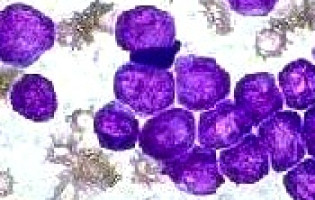
Cancer Research UK-funded scientists at The Institute of Cancer Research, London, have discovered what may cause some treatments to stop working in people living with bowel cancer, a type of cancer which causes around 16,800 deaths in the UK every year.*
The findings could help researchers use information about a person’s cancer to make better use of current treatments and develop more targeted therapies for bowel cancer, designed to stay one step ahead of the disease.
In research published in Cancer Research,** the team studied bowel cancer organoids, tiny lab-grown versions of human organs that model how cancer cells behave in our bodies.
The researchers looked at two sets of bowel cancer organoids with different genetic makeups and how they responded to four cancer treatments*** given in different sequences (drug A, then drug B, etc.) over 45-day periods. This helped build up a detailed picture of their evolution and behaviour over time.
The study found that cancer cells can develop a “memory”, through the switching on and off of certain processes in the cell, known as “epigenetic changes”. Cells can “remember” the form and appearance they need to adopt to survive harsh conditions, like being bombarded by cancer drugs. The resulting survival mode “memories” are then passed on when cancer cells grow and divide, resulting in a cluster of drug-resistant cancer cells.
Senior Scientific Officer at The Institute of Cancer Research, London, and one of the lead authors of the paper, Dr Erica Oliveira said:
“We have known for some time now that drug resistance isn’t simply caused by further mutations in the DNA of cancer cells.
Our work shows the additional role epigenetic changes play in giving cancer cells the ability to adapt to their surroundings, unfortunately resulting in certain cancer treatments becoming less effective over time.
We look forward to further studying these processes to see if we can target them directly as a strategy for beating bowel cancer.”
The work was funded by Cancer Research UK and the Italian Association for Cancer Research (AIRC) with additional support from the Wellcome Trust, the National Institute for Health Research Biomedical Research Centre at The Royal Marsden NHS Foundation Trust and The Institute of Cancer Research (ICR), and Imperial College London.
Cancer is a complex disease. Existing treatments don’t necessarily work for everyone, and all cancers are at risk of evolving and becoming resistant to treatments over time. This, in part, is down to changes in the genetic instructions inside the DNA of every cell.
Increasingly, scientists are building a better understanding of the other processes involved in driving drug resistance, including further epigenetic changes to our DNA. The findings from this multi-year research project give us one of the most detailed studies to date about how drug resistance can develop in bowel cancer.
Professor of Cancer Genomics and Evolution, Head of the Centre for Computational Biology at Human Technopole, and formerly The Institute of Cancer Research, London, Professor Andrea Sottoriva, said:
“Our findings could potentially be used to inform how we treat bowel cancer in a more targeted way. If we can test a sample from a patient with bowel cancer and confirm their cancer cells have survival 'memories' and are at risk of developing resistance, we could potentially change the order that current drugs are given, or develop new therapies designed to make cancer cells ‘forget’ how to survive.”
Research Information Manager at Cancer Research UK, Dr Marianne Baker, said:
“We’re proud to have funded this work studying how bowel cancer cells can ‘remember’ and pass on cancer drug resistance. Thanks to decades of research, we know that there’s more to cancer than the DNA mutations that can cause the disease – knowing how cancer cells ‘read’ their DNA instructions is also key to beating it.
Discoveries like this could help us predict how treatments might affect someone’s cancer and how it could evolve over time, allowing us to design more targeted ways of treating the disease – whether that’s making use of current drugs, combining treatments together or designing new ones.”
Finding new and improved treatments for cancer is one of Cancer Research UK’s top priorities. Cancer Research UK and partners recently announced £5.5m funding towards the CRC-STARS research consortium, a world-leading international research team tasked with making personalised medicine a reality for people with bowel cancer, which includes some of the researchers involved in this study.
Discovery scientists across the UK have been improving understanding of the biology of cancer, uncovering potential new targets for treatments and helping to understand why some treatments don’t work, while clinical researchers have been testing these new treatments in people with cancer and pushing forward their journey into the clinic.
The paper, titled “Epigenetic heritability of cell plasticity drives cancer drug resistance through one-to-many genotype to phenotype paradigm”, with co-lead authors Dr Erica Oliveira, Salvatore Milite and Dr Javier Fernandez-Mateos, was published in Cancer Research**.
Source: The Institute of Cancer Research
We are an independent charity and are not backed by a large company or society. We raise every penny ourselves to improve the standards of cancer care through education. You can help us continue our work to address inequalities in cancer care by making a donation.
Any donation, however small, contributes directly towards the costs of creating and sharing free oncology education.
Together we can get better outcomes for patients by tackling global inequalities in access to the results of cancer research.
Thank you for your support.